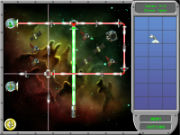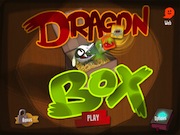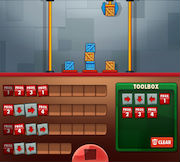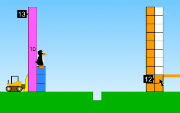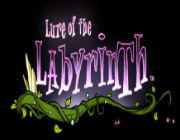 Reviews
Reviews
HOME PUZZLES REVIEWS ABOUT
Reviews Of Puzzles Built Somewhere Else (3rd Party)
We're all about creating and finding the best educational puzzles out there. Here are reviews of some of the best we've discovered.
Refraction by UW Center for Game Science
Refraction is a fantastic website for teaching fractions.
They've done a great job of creating puzzles that teach fractions directly, by dividing up and redirecting a laser to power various rocketships. The challenges are excellently produced, getting increasingly harder as you go and integrating more and more advanced concepts around fractions.
It's free to use and online so easy to access. Really the only downside is that it's built in flash so not only is not available in any app store, but you can't use it on an iPhone or iPad.
Still this is one of the best sites I've seen overall. Highly recommended. Hopefully they'll create a non-flash version soon. If not then we may try to do it for them.
Try Refraction >
DragonBox by We Want To Know
DragonBox is one of the best apps I've seen for teaching the strategies required to solve algebric equations.
They've done a great job of focusing on the puzzle-like aspects of algebra, starting with puzzles using colorful icons that represent variables before transitioning to actual equations.
The app focuses on solving algebraic equations and does an excellent job of communicating both the techniques and the strategies involved with very little instruction.
Unfortunately like most algebraic teaching, the usefulness of algebra is not explored. The strategies to solve problems are very effectively taught, but the connection to the real world is ignored.
Still the app does a great job of making math feel like an engaging, interesting, and challenging puzzle, as it should. It does a good job of giving students a taste of what it feels like to be a professional mathematician.
Try DragonBox >
CargoBot by Two Lives Left
CargoBot is a simple puzzle game that teaches the basics of programming (loops and conditional statements).
That may sound intimidating, but they've created a great trial-and-error environment with a simple tool box that lets you learn the basics of these concepts without writing any programming.
You basically try to move boxes around by programming a crane to pick up, move, and drop boxes to solve the puzzle. It's a very practical way to approach introductory programming, it's presented in a great trial-and-error environment, and is quite engaging.
Really the only two knocks against it are that the puzzles get a little too hard a little too fast, which could result in excessive frustration or even someone giving up, and it is only available iPad, which means you can't play it at all unless you own an iPad.
It is free, though, so if you own an iPad I would highly recommend CargoBot. I think it's very likely that a student will leave CargoBot wanting to learn more about programming so they can do more interesting things than just solve puzzles in CargoBot. That's the most important factor from my perspective.
Try CargoBot >
Shikaku by Nikoli
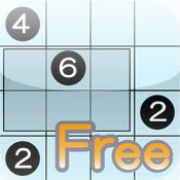
Material: Multiplication / Factors
Availability: Web, Mobile, Paper
Cost: Free - $5.99
Try Shikaku >
Shikaku is from the same people who created Sudoku and has a very similar style to it. Unlike, Sudoku, though, Shikaku introduces some basic multiplication.
In order to solve the puzzles you need to create squares or rectangles that add up in area to the number they encompass. So in order to satisfy a "12" box you could fill in a 12x1 area or a 3x4 area or a 6x2 area.
Just like Sudoku, the engagement level is high. It's a quality puzzle that will likely entertain adults as well as students.
Really the only drawback is that there is limited learning available. It's good practice for basic multiplication and factors, providing feedback on whether the area filled in satisfies the number's requirement, but most of the puzzles don't go above 9 and those that do don't seem to go above 16 or so, so you're not going to get in to larger numbers at all.
If the puzzles involved a wider range of numbers then Shikaku would be a better tool for learning multiplication and factors. If it were to do that, though, the puzzles may become too challenging. As it is it's still a great fun puzzle that uses basic multiplication.
Try Shikaku >
ST Math by MIND Research Institute
ST Math stands for Spatial Temporal Math. Basically it teaches a wide range of mathematical concepts without language (no instructions at all), using puzzles that make it easy to learn through trial-and-error.
The techniques are backed up by extensive research and have already shown significant success within schools. It is one of the most pure examples of puzzles that teach exclusively through trial and error. There are no instructions at all, even for the most complicated concepts.
Basically we love it.
Unfortunately, although the software is built for online distribution, you can't get access to more than a few samples without contacting the company. I think this is a real shame. I've contacted them trying to figure out why they don't make it more accessible, but for now it's unlikely you'll be able to use ST Math except in the classroom.
Try ST Math >
Lure of the Labyrinth by Maryland Public Television, MIT
Lure of the Labrynth is a game with numerous math-based puzzles for teaching pre-algebra, tied together by a comic-like storyline revolving around a lost pet.
The game has a very high production value. Clearly a lot of work went in to developing it. The story line could work well, although I didn't really get caught up in it. The puzzles are well-done, but they aren't quite granular enough, making them a bit too challenging.
It seems like a lot of work went in to the production of the game when I would have prefered more work go in to the intuitiveness of the game and the puzzles.
Like any quality puzzle I would recommend giving them a shot with any student, especially since this one is free and the production value is quite high. Unfortunately, I don't have a whole lot of confidence that students will engage with this game enough unless they get caught up in the story, which could happen.
The puzzles themselves are, like most puzzles, an engaging way to practice pre-algebra concepts, such as proportions, but they don't really make any attempt to teach the concepts, or at least the feedback loops are not tight enough to facilitate learning for beginners. I think many beginners will give up before being able to solve many of the puzzles unfortunately.
Try Lure of the Labyrinth >
Mozilla Thimble by Mozilla
Mozilla Thimble is an effort by Mozilla.org (makers of the Firefox web browser) to make learning html more accessible. It harkens back to the day when most people learned html by looking at the code other people had written on websites by "viewing the source". In many ways the fact that you could view the source code for web pages was instrumental in both the education of thousands of web developers as well as the explosion of the web itself.
Mozilla has taken it one step further with Thimble, putting the source and the website side by side and making it so that any change to the source immediately changes the website. This tight feedback loop is fantastic and makes it easier to see the effect your changes have on the website. It's a great trial-and-error learning environment.
Unfortunately there's not much purpose provided by Thimble. They do try to create projects, but most have an excessive amount of instructions buried in the comments. I think it's unlikely that a student who is just exploring will become engaged by Thimble enough to get any real value out of it. It's certainly possible that a student will get in to it, but I think it's unlikely.
So if you're coming to the table with your own motivation (e.g. you want to build a website), then I think Mozilla Thimble is a great tool. With education, though, too often the problem is that there is a lack of purpose and the educational activity needs to supply that purpose. In this case Mozilla Thimble falls short. I think it's unlikely that a student will run with Mozilla Thimble without a lot of encouragement, support, and assistance.
Try Mozilla Thimble >
Foldit by UW Center for Game Science
Foldit is crowd-sourced experiment that lets you try and figure out how to fold proteins to try and discover their optimal folded state.
The puzzle is educational, but doesn't do the best job of providing enough context for someone to walk away with a better understanding of the biochemistry they are working with.
The site has the great benefit that the puzzles you are solving are actually helping scientists discover cures for diseases such as AIDS. In fact, in 2011, players of Foldit helped to decipher the crystal structure of the Mason-Pfizer monkey virus (M-PMV) retroviral protease, an AIDS-causing monkey virus. While the puzzle was available to play for a period of three weeks, players produced an accurate 3D model of the enzyme in just ten days. The problem of how to configure the structure of the enzyme had stumped scientists for 15 years [from Wikipedia].
Despite that enormously practical benefit of helping to cure AIDS and other diseases, Foldit is not the most practical experience for students. Although I'm sure the developers did the best job they could to make the site intuitive and fun, the mechanics are still quite clunky and I think it's unlikely that students will stick with it long enough to gain any significant educational benefit.
I can't quite recommend it, but I do feel it would be a shame if someone didn't try it out based on my recommendation and actually loved it and went on to make a significant contribution to science, so maybe give it a shot with the expectation that it probably won't click as easily as I would hope.
Try Foldit >
